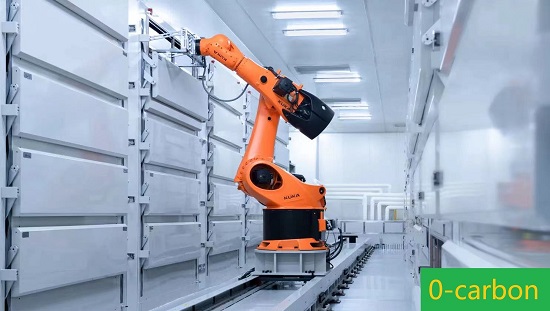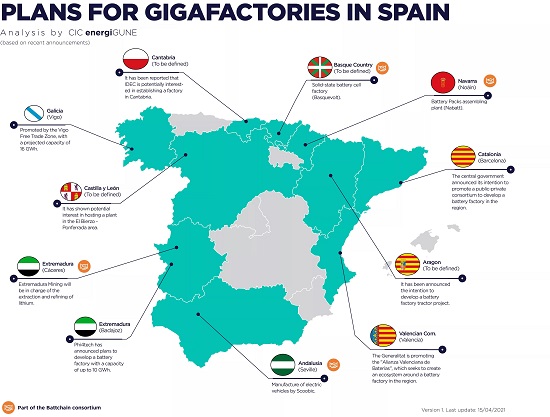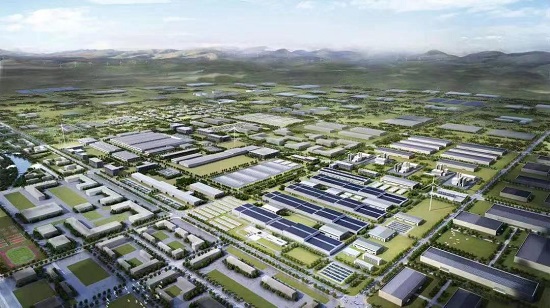The selection of battery suppliers by international car companies has not only focused on quality, cost and efficiency, but also began to focus on zero carbonization and localization.
Zero-carbon battery factories
Zero-carbon battery factories are rapidly being distributed around the world.
YG Power announced that it will build a lithium power battery gigafactory in Spain with a planned production capacity of 30GWh, which will be completed and put into production in 2025.
This construction project is another important layout of YG Power’s zero-carbon battery factory after China, Japan, the United Kingdom, France and the United States, and will also become YG Power’s third zero-carbon battery factory in Europe.

The Gigafactory will use a zero-carbon system solution to achieve 100% renewable energy supply and carbon-neutral operations.
At the same time, it will start the construction of the local lithium battery ecosystem in Spain, and promote the innovative development of full life cycle technologies such as intelligent charging facilities and battery recycling.
The new factory will provide global leading car brands with higher quality, longer cruising range, more cost-competitive, cleaner and low-carbon power lithium battery products, and help Spain, the second largest car producer in Europe, to become a new European electric vehicle industry center.
The global layout of YG Power’s zero-carbon factories shows that global vehicle electrification has entered a period of rapid growth. Economies such as Europe and the United States are significantly more active in this round of layout.
Car companies’ move
At the same time, European and American car companies are more interested in not only the clear requirements for quality, cost and efficiency, but also pays more attention to zero carbonization and localization of chosen EV lithium battery suppliers.
As the second largest automobile producer in Europe, Spain has a huge automobile industry cluster, and its automobile production capacity is second only to Germany. International first-tier car companies including Volkswagen, Mercedes-Benz, Audi, PSA, Nissan, and Ford all have industrial manufacturing bases in Spain.
Aiming at the opportunity of electrification transformation of the Spanish automotive supply chain, YG Power’s forward-looking deployment in the Spanish market has become another important step in the construction of its European power battery map.

At the same time, relying on the accumulation of technologies in the zero-carbon field, providing car companies with high-quality, localized high-quality power battery production capacity plays a very important role in Spain, which is accelerating the transition to new energy.
This zero-carbon battery project is also a key project supported by the Spanish government’s “Strategic Plan for Economic Recovery and Energy Transition (PERTE-VEC)”.
China’s zero-carbon battery production capacity is globally deployed. In fact, China’s leading battery companies with international supply capabilities and experience are becoming the choice of more and more international car companies.
Attracting high-class power battery companies to localize their high-class production capacity and complementing the core shortcomings of the new energy vehicle supply chain has become a consensus among European countries to implement energy transition and catch up.
EU carbon tariff
It is worth mentioning that the EU carbon tariff (Carbon Border Adjustment Mechanism, CBAM) was approved by the EU Council on March 15 this year. The superimposition of the previous revision of the “New EU Battery Regulations” means that Europe’s control of the local power battery industry chain will be more stringent.
On June 7, the European Parliament will hold a final vote on the EU carbon boundary adjustment mechanism proposal. The establishment of the EU carbon boundary adjustment mechanism will have a chain reaction on a global scale.
This means that in order to deeply participate in the global competition of power batteries, in addition to the competition of technical products, production capacity and supply chain, the localization and zero-carbonization of power batteries are also becoming a new competitive factor.
Expansion
In terms of global capacity deployment, in June 2021, YG Power and Renault of France cooperated strategically, and announced the construction of France’s first digital and green power battery factory in Douai;
In July of the same year, YG Power and Nissan deepened strategic cooperation, Construction of the UK’s first power battery Gigafactory in Sunderland.
In February this year, YG built Japan’s largest power battery factory in Ibaraki; in March, YG Power and Mercedes-Benz of Germany reached a strategic cooperation and announced a new power battery gigafactory in Kentucky, USA.
From a planning point of view, YG Power has deployed 11 zero-carbon battery production bases in China, Japan, the United States, the United Kingdom, France and Spain, and the total production capacity of zero-carbon batteries in 2026 will exceed 300GWh.
While the production capacity is rapidly replicating, zero carbonization has also become the biggest label for YG Power to participate in the global market competition.
At present, YG Power has established a monitoring and tracking system for carbon emissions throughout the battery life cycle. Through accurate carbon footprint analysis, reasonable emission reduction measures have been formulated, and more effective zero-carbon solutions have been explored.
In addition, the zero-carbon industrial park integrates system solutions in the fields of wind power, photovoltaics, energy storage, hydrogen production, carbon management, power trading, etc. to realize the zero-carbon closed loop of the industrial park, and will also become the benchmark for zero-carbon system solutions and power batteries factories.

The zero-carbon industrial park model will also be replicated and promoted in Europe, Australia, the Middle East and Southeast Asia.
“Zero-carbon battery” is based on the full life cycle approach (LCA), which analyzes the carbon footprint of lithium-ion power batteries from raw material mining to production, and offsets them through green power applications and carbon sink procurement, and then carried out by TüV Süd Carbon neutral certification (PAS2060)
After entering a new industrial cycle, new variables are emerging in the global competition of global power batteries, and the weight of regionalization and zero-carbonization is increasing.
With the acceleration of the global layout of power zero-carbon battery production capacity, the trend characterized by zero-carbon battery products, new models of zero-carbon industrial parks, and global zero-carbon technology partners will lead and accelerate the zero-carbon transformation of the global power battery industry chain.



